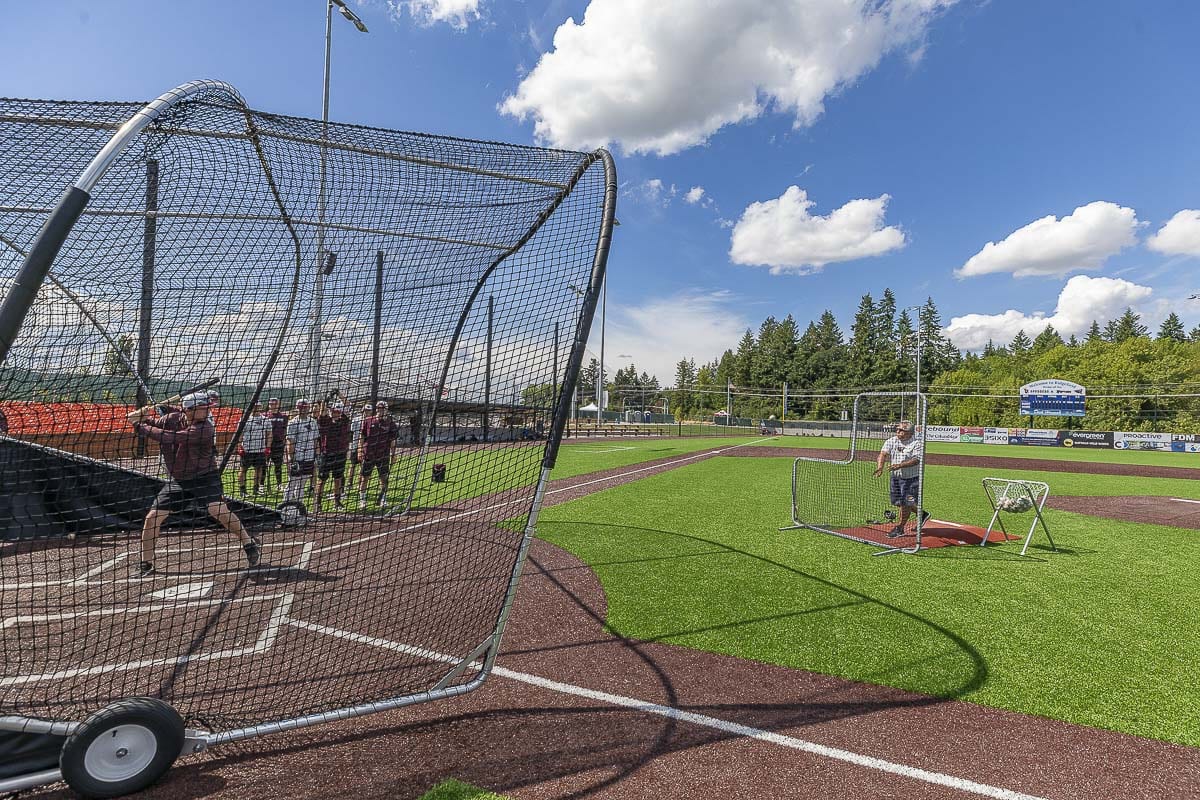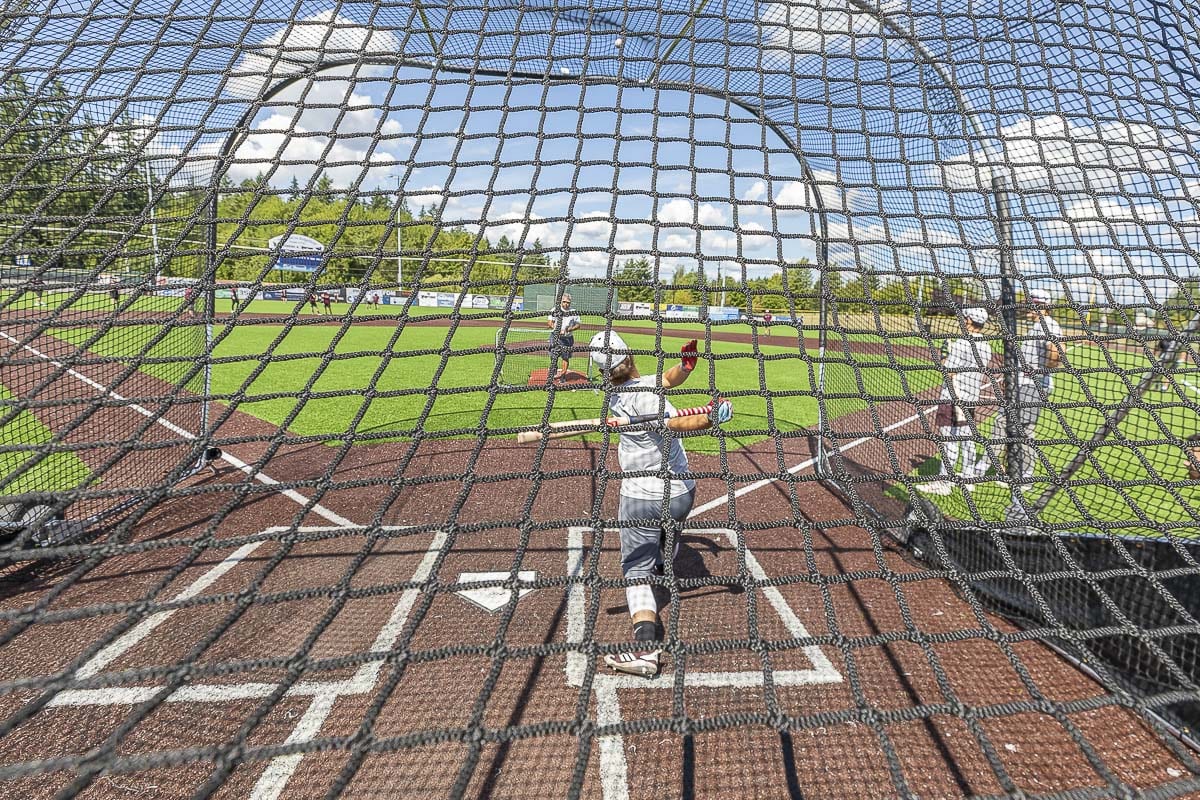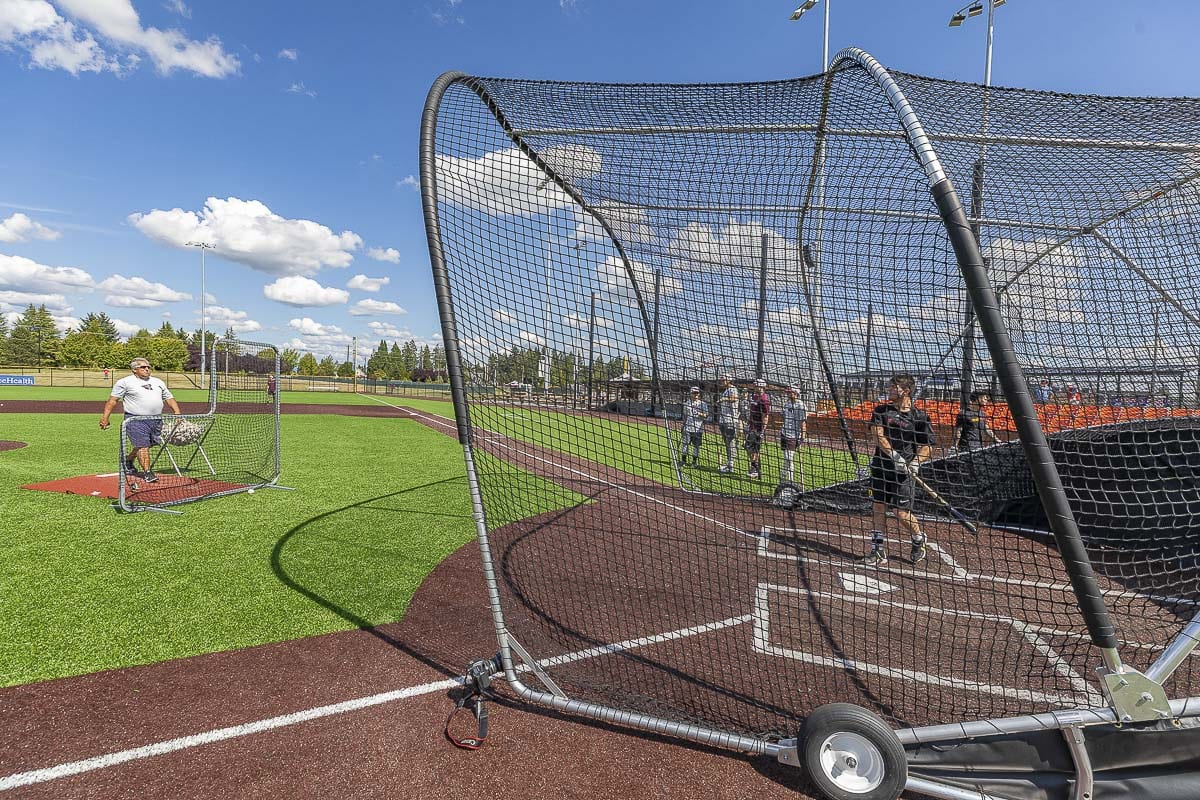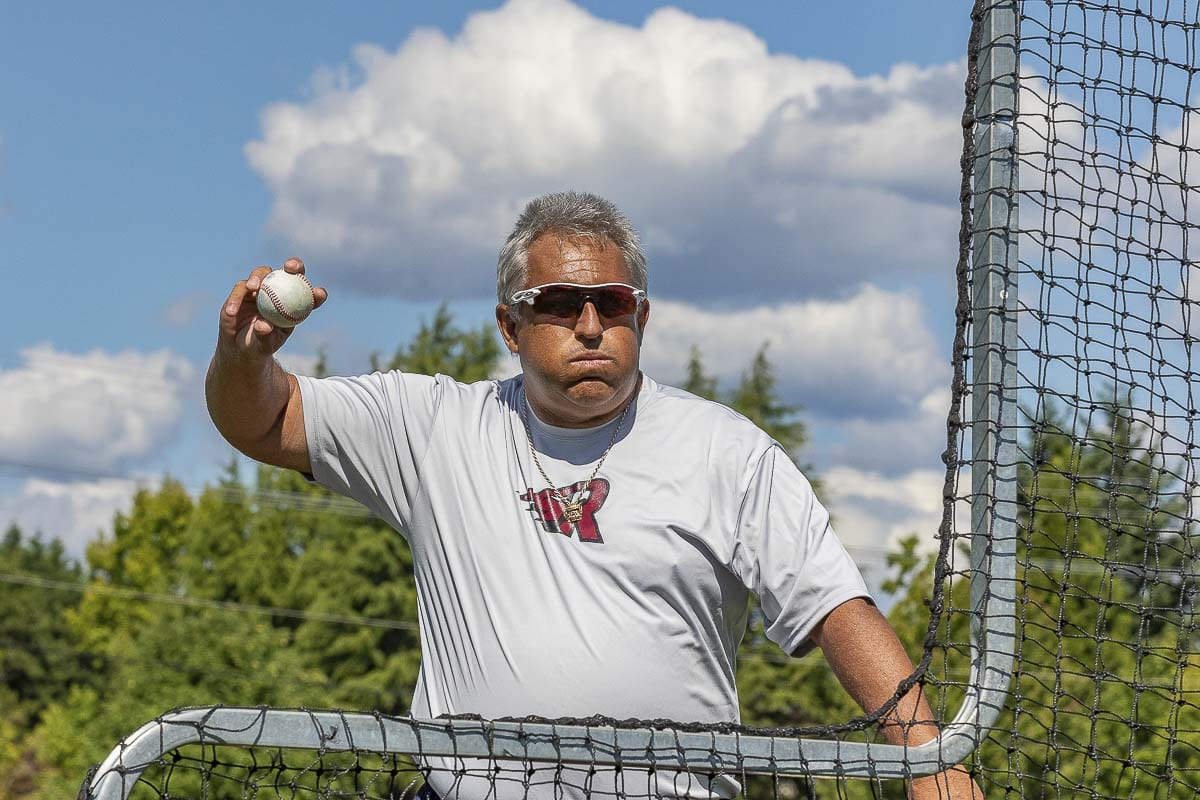Players, coaches try to balance focus and fun during training sessions
RIDGEFIELD — It is a time for fun, but serious fun.
For the players, it is a chance to hone their skills, work on their swings, get ready for the game.
For the coaches throwing the pitches, it can be tough on the arm and tougher on the body when they forget to get behind the protective netting.
Hours before a home game, the Ridgefield Raptors are conducting batting practice.
BP, as it is called, is as old as the game itself.

The best players are focused during this time. It is not just to get some whacks in before the game.
Still, this is a game. The players, and coaches, also get to have some fun with each other. Not every pitch is hammered.
Some players will get ticked off when they miss one. Choice words can be heard at times. Other times, they laugh at themselves, knowing it is part of the game.
Oh, and their teammates will laugh at them, too.
Players arrive three or so hours before the first pitch. At this level of baseball — summer ball in the West Coast League — it is the players who roll out the cage, get the equipment ready for BP.
Then they get to work. Very little time is wasted. One guy in the cage for a few swings, then the next.
On this day, assistant coach Rob Parama is throwing BP. It is estimated he will throw between 400 and 500 pitches. Naturally, these are not 90-mph heaters. Still, 400 throws can take its toll.
Ridgefield Raptors (13-11 WCL)
This week: The Raptors took two of three West Coast League road games over the Bend Elks. The Raptors rolled to a 14-3 win in Tuesday’s series opener. Michael Hicks drove in three runs. Jack Bauer had two hits and scored three runs. Noah Taylor drove in three. Bend got the middle game, 8-1, but then the Raptors went on another hit parade on Thursday, recording a 15-8 win. Cameron Repetti drove in three runs. Steve Ramirez and Tyler Erne each had two hits and each scored three runs.
Next homestand: The Raptors return home Friday for a three-game series with the Corvallis Knights. First pitch for Friday and Saturday is 6:35 p.m. Sunday’s game is a 3:05 p.m. start
Promotional: Friday is a day the Raptors will salute the military and veterans. … On Sunday, it is Sunday Funday. Children 10 and under get in for free with a paid adult, courtesy of Kiddie Academy.

Parama, though, is 57 years old and shows no signs of slowing down.
“God did not give me talent to do too much, but He did give me the ability to throw a baseball,” Parama said. “I’m hoping when I’m 75, I can still throw BP.”
Parama coaches with Raptors manager Chad Cota at the College of the Canyons in California, so he has seen his share of talented college players. There is a transition from high school to college that can be seen in batting practice, when the players, at first, just want to swing for the fences.
“They’re still young. Coming out of high school, they want to be like the big boys,” Parama said. “They learn real quick. They have to really work on their game, work on their swing.”
Steve Ramirez (Riverside City College) tries something different during each round of his BP sessions.
“First round, I’m looking to go opposite field. I’m just trying to hit line drives,” Ramirez said. “Second round, up the middle.”
It works for him.
“It helps me stay locked in for the approach I want to take in the game,” Ramirez said. “It helps me be specific on what pitch I want to swing at. What I do in BP has a carryover into what I’m trying to do in the game.”
“I need my swings before a game,” said Aaron Zavala (University of Oregon). “Just get your swing right before your game. You’ve got to make sure it’s locked in, ready to go before you see live pitching.”

Home teams usually take BP first. The home team gets to take a break before the game. But when the Raptors are the visiting squad, they pretty much go from PB to game mode. Sometimes, that is an advantage, Zavala said.
“On the road, (BP) carries right over into the game. It’s fresh in your mind,” he said.
Not every session is perfect, though. A pop-up might smash into the cage, with the ball coming straight back down right in front of the batter.
That’s called a cage killer. It’s not good.
Then there is the ball that clearly would be a routine ground out to an infielder. Not good again.
Parama said, as a coach, he must determine whether a player needs his coaching right then or just a good-natured jab. A player in a slump probably does not need to be the target of a joke. However, a player who just misses a pitch once in a while has to be ready to hear it from his teammates, and a coach.
“You try to keep it light,” Parama said.
After all, a baseball season is a long grind. Gotta have fun.
The Raptors compete with each other in the cage. The bombers like to count how many homers they hit. And you just know those guys hear it when they hit one 40 feet rather than 400.
“My favorite line is, ‘You hit like a P.O.’ That’s Pitcher Only. ‘That’s a P.O. swing.’ That’s my go-to line,” Parama said.
It is no laughing matter, though, when a coach gets drilled. Well, at least not initially. There might be jokes made at the coach’s expense later, but at first, it can be scary.
Coaches throw PB from behind what’s called an L-screen. It is designed for the pitcher to get the ball to the plate and get behind the protection of a net during his follow-through. Not everyone gets behind the net in time, though.
It happens even to the most experienced coaches.
“You get tired. You lose focus,” said Parama, who said he has been hit several times. “Thank God it’s never put me out.”
“If you hit him, you feel bad,” said Ramirez, who has done it a few times in his career. “All the coaches I’ve hit just wear it off and get right back into it.”

That is what happened this past spring to Nick Allen. An assistant with the Raptors, he is the head coach of the Ridgefield High School team. He took the biggest shot of his career with the Spudders.
“You flinch. That’s a natural reaction. But I didn’t think I was going to get hit. I knew it was going to be close,” Allen said. “Next thing I know … lower triceps. It went numb.”
A direct hit. Not a glancing blow.
“Everybody on the team, ‘Oh my gosh, Coach just got drilled. What’s going to happen next? I just picked up a ball and kept going. I threw for about 45 more minutes. But it was stiff and sore for two weeks. That’s the worst I’ve ever been hit.”
“And I thought I was behind the screen.”
It could make someone gunshy to return. After all, for PB, the pitcher is just 40 or 45 feet away. Even with the protective screen, it is a risk to be so close. But BP is part of the game and someone has to throw it.
“It’s not an easy thing to do, to throw BP,” Allen said. “It is a learned skill. You get used to it.”




